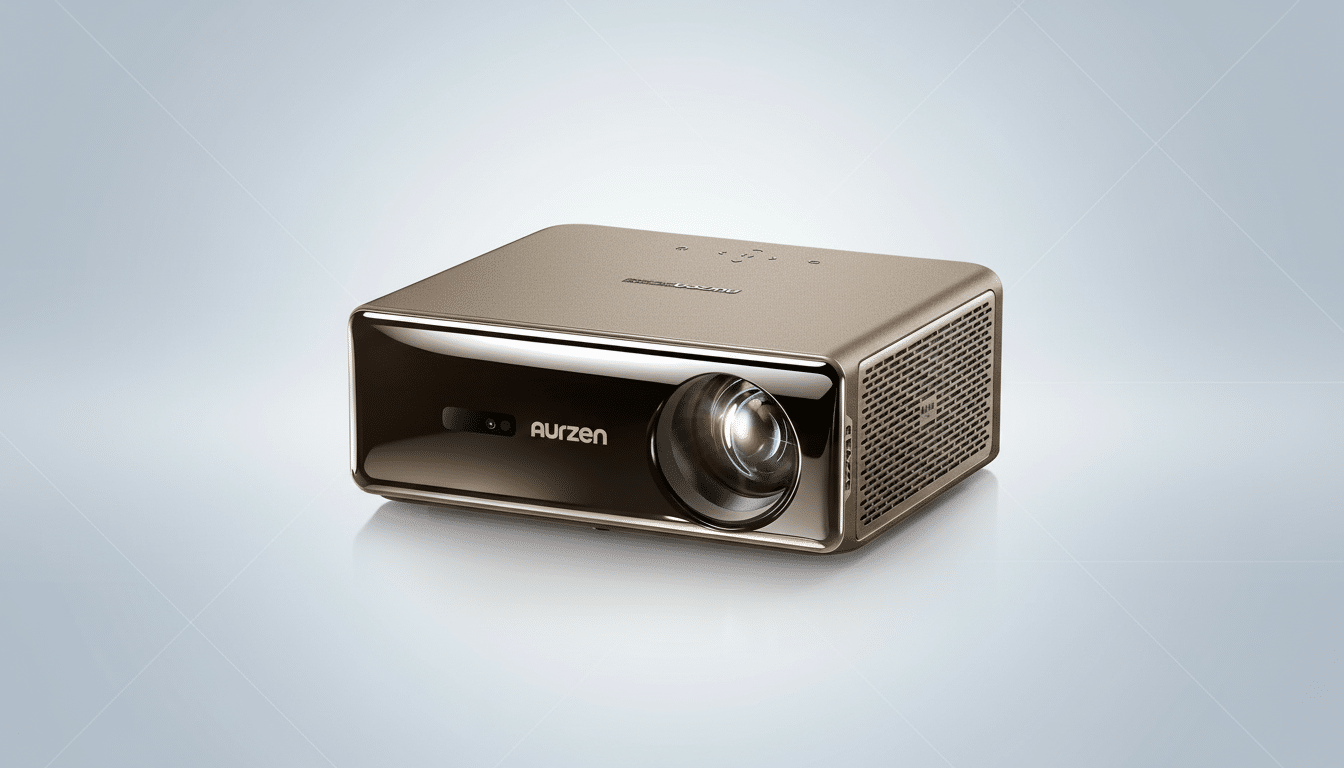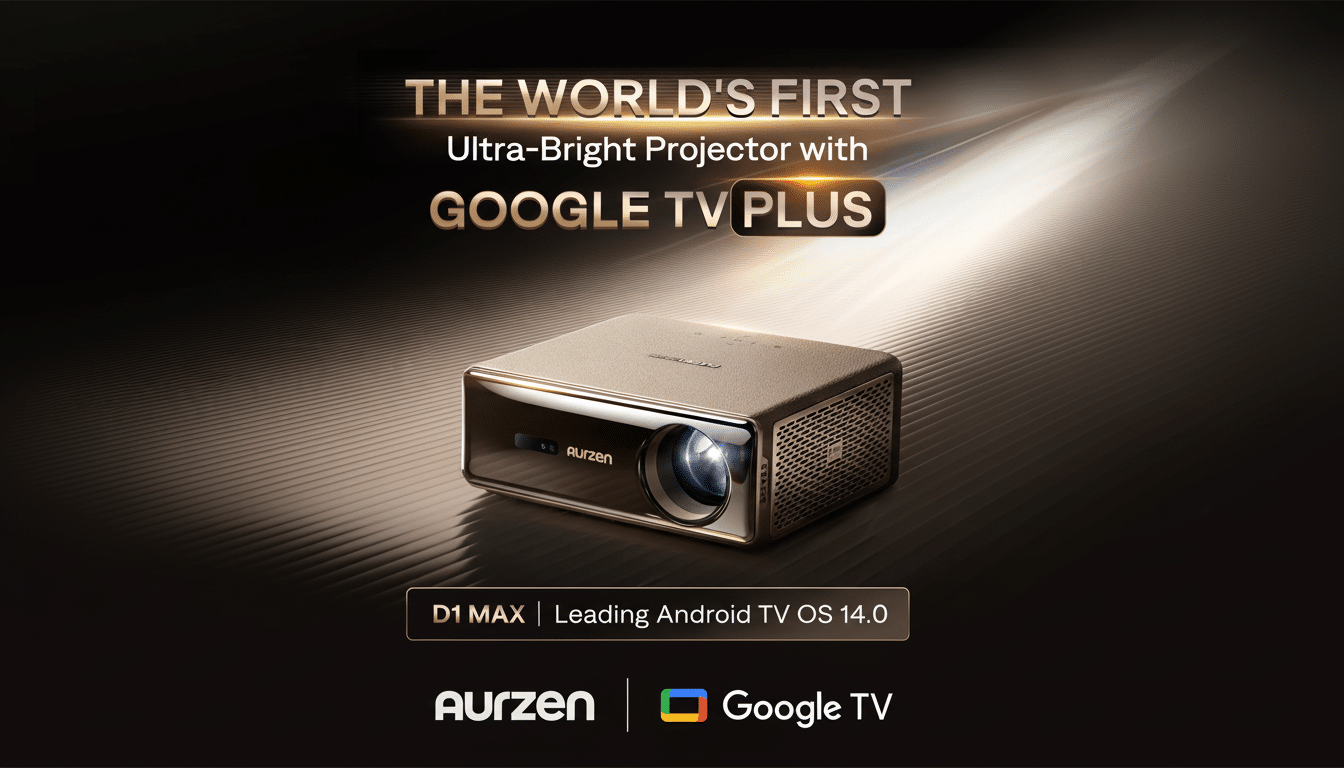Aurzen’s latest home projector, the EAZZE D1 MAX, has launched with the kind of introductory pricing that will have you upgrading your living room movie experience in an instant.
The portable model is powered by Android TV 14 with the Google TV experience, projects in native 1080p and offers 1000 ANSI lumens. It’s priced at $500, but an early coupon lops up to $150 off, bringing it down to midrange streaming-stick money for a full-on big-screen setup.

Android TV 14 delivers native apps and Google TV support
Software tends to be the Achilles heel of projectors, yet this model ships with Android TV 14 out of the box. That means the new Google TV interface, voice search through the Google Assistant, and access to popular streaming apps without requiring a dongle. Importantly, Aurzen notes native support for Netflix (projector compatibility with various streaming services is always a big potential pain point). With more than 270 million global subscribers, the most recently reported number from Netflix in recent filings, a sanctioned, out-of-the-box app matters to millions.
Aside from convenience, smarter app compatibility and some long-overdue quality-of-life touches (system responsiveness is on point, and power modes are getting more sophisticated) pop. No projector brand can ensure the same update cadence of a top-end phone maker, but by being based on Android TV 14, the D1 MAX at least has a jump-start over the tons still shipping with aging TV builds.
Specs tuned for actual rooms and real-world viewing
The D1 MAX uses a 1080p LCD light engine mated to a 1000 ANSI lumen brightness rating. The ANSI rating, established by the American National Standards Institute, provides a better sense of usable light output than some of the inflated “LED lumens” figures seen in some promotional material. In reality, 1000 ANSI lumens gets you a sharp 80–120″ picture in a dark room and a watchable one with low ambient light. Dark scenes will always look their best with lights turned down low, but this brightness grade can easily handle movie nights without blackout curtains.
Auto-focus and auto-keystone corrections make setup a breeze, perfect for first-time pro A/V users or fast-setup scenarios (such as presenting on location during events). Like any projector, keystone is a digital warp that can drain sharpness at edges, so squaring the chassis with the screen remains the ideal. On the audio side of things, dual 10W speakers with Dolby Audio are hoping to fill in for dialogue clarity and casual watching (without needing an external soundbar). That’s a pretty good inclusion at this price point, although dedicated cinephiles might still want to route sound through a standalone system for larger rooms.

This is not a 4K laser projector, and Aurzen isn’t trying to pass it off as one. But the pitch here is straightforward: good, old-fashioned 1080p, decent brightness and a contemporary streaming platform in one box. That’s the right feature mix for a lot of living rooms and dorm setups.
Pricing that highlights the pitch with early coupon deals
The sticker price is $500, but the early coupon downshifts that by as much as $150, with an effective cost of about $350. For reference, a lot of 800–1200 ANSI lumen projectors from established brands tend to cost in the range of $600 to $900 for Android TV models. The D1 MAX drops under that price bracket and keeps most of those functions intact. That’s why the launch code looks aggressive: it doesn’t appear that buyers are swapping out the streaming platform or trading off basic brightness to hit this number.
Market followers such as Futuresource Consulting have long reported ongoing demand for value-led home projection, with users mixing streaming with larger screens. The D1 MAX plays right into that trend, offering a turnkey path to a 100-inch experience at something like one-tenth the price of a big TV.
What to watch for before you buy this new Aurzen projector
Specifications tell only part of the story, but early adopters will want to pay close attention to independent black levels, color accuracy, fan noise and input lag testing. The contrast performance of all LCD-based systems can vary, and you’ll want to verify latency numbers before moving further. Long-term software support is another checkbox: despite the unit launching on Android TV 14, timely firmware updates will play a huge role in determining how well it ages.
Nonetheless, on the launch details alone, Aurzen is making a strong case for value. If you’ve been tossing around the idea of a projector in your living room, for sports, movie nights or casual streaming, the EAZZE D1 MAX is positioned at an attractive sweet spot where price, brightness and platform stability align to satisfy. The headline discount not only sweetens the deal — it also makes this model pop in a crowded midrange scene, where compromises are typically more glaring.

